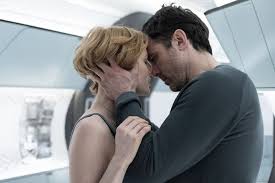Slingshot 2024 Movie Review
Throughout the history of cinema, spaceships, and futuristic environments have been commonplace, and it’s easy to wonder if all (or most) possible ideas for science fiction have been exhausted. It’s 2024, so you’d think that, by now, writers would have run out of ideas. This is somewhat the case with Swedish filmmaker Mikael Håfström’s “Slingshot,“which attempts to do a lot with its relatively low budget and partially succeeds. While the screenplay, written by R. Scott Adams and Nathan Parker, contains moments of inspired storytelling, the film ends up being a far cry from superior space-set movies like “Interstellar.“ And yet, the presence of three actors fully committed to their respective roles and the intriguing, twist-filled story (including an ambiguous ending) make this sci-fi film worth a watch.
Sometime in the near future – we never know for certain when the film takes place, but this is hardly relevant – a spaceship is headed to Titan, one of Saturn’s moons. The crew is preparing for a dangerous maneuver named “slingshot.“Two of the crew members, John (Oscar winner Casey Affleck) and Nash (Tomer Capone of “The Boys“) are experiencing severe side effects from deep hibernation as they struggle to see the difference between reality and hallucinations. They also have to deal with the no-nonsense Captain Franks (Oscar nominee Laurence Fishburne) and the fact that the mission (and maybe even the ship itself) might be compromised. John also dreams and thinks wistfully of his former partner, Zoe (Emily Beecham), one of his competitors for his position on the ship.
Håfström has somewhat of a mixed filmography, and two of the films for which he’s best known are “The Rite“ (which received poor reviews) and “1408“ (which received good reviews). “Slingshot“ seems to lie somewhere in between those two. While the direction isn’t anything exciting, it’s still impressive that he is able to make such an ambitious piece of sci-fi with a much lower budget than other films of the genre. Screenwriter Adams is fairly new, having only written 2011’s “Donner Pass,“ while co-writer Parker has written for acclaimed projects such as 2009’s “Moon“ and the limited series “The Underground Railroad.” “Moon,“ in particular, showcases some unique, unexpected storytelling, and we see some of that in “Slingshot.“
While the concept itself is innovative enough, and the characters are distinctive, Adams and Parker’s script is replete with cliches, along with dull and/or hackneyed dialogue. We’ve all seen space-set films that deal with crew loyalties shattering while one person tries to get them to operate as a team. Also, the character motivations – aside from those of John – are unclear, to say the least. While it’s certainly interesting to see the psychological effects of deep hibernation on the crew, the exploration of reality vs. hallucination is hardly revelatory. Additionally, while the film is under two hours, the pacing feels off, especially since the big event of the slingshot maneuver happens so quickly in the narrative. There’s some build-up missing, and with such a climactic event occurring so soon, one might wonder how that momentum could be maintained. Thankfully, the writers fill the remaining screen time with plenty of twists and big moments that keep the runtime from overstaying its welcome.
In addition, the script views the ship – here with the rather uninspired name “The Odyssey“ – as another character, which, on paper, is an interesting perspective. The production design and technology present on the ship are probably similar to things you’ve already seen, but, as it turns out, the ship is less interesting than the psychological deterioration of the movie’s characters. The so-called slingshot maneuver is smartly explained through a flashback, and it’s the best use of flashbacks, which are seen throughout the film’s 108-minute runtime. The flashbacks are meant to convey John’s struggle to maintain his grasp on reality, and eventually, we become as confused as he does. The numerous twists may irritate some viewers – not to mention the ambiguous ending meant to evoke something like “Inception.“ At some point, you may start to wonder if there are too many twists, but the film doesn’t care what you think. Instead, the shocking, puzzle-piece-like ending is sure to get viewers talking and perhaps even rewatching it to see if they can figure it out.
As mentioned, all three actors are solid, with Affleck being the obvious standout. He handles the increasingly frail mentality of his character with dexterity, especially when big reveals towards the end call everything into question. He has always been such an engaging, empathetic performer, and even when he’s given unmemorable dialogue, he plays it convincingly. Fishburne’s captain is the typical no-nonsense type of leader focused solely on the mission, and the actor has the ability to appear menacing, even when not saying a word. Watching him one-on-one with Affleck is a delight, even when the story becomes too far-fetched and wild for its own good. Capone, who has been reliably great on “The Boys,“ probably gets the showiest role here, as his character seems to struggle the most from hibernation-induced hallucinations. Unfortunately, his screen time is limited in the latter half of the film, and despite the audience knowing very little about him (and about Franks), we’re still concerned for his well-being. Beechum is a fine presence, but the romance between John and Zoe isn’t presented in a compelling format. While we understand why they’re drawn to one another, their relationship is essentially glossed over, leading the viewer to feel apathetic when they’re torn apart.
The score, composed by Steffen Thum, is lovely, even if it doesn’t always match the tone(s) of the accompanying scenes. To the film’s credit, the sound mixing effectively conveys the space environment and how hibernation affects the characters. We also get a recurring message post-hibernation from the ship (voiced by Nikolett Barabas) detailing the side effects a person might experience after receiving such heavy sedation. While it’s repetitive, this is clearly intentional, as it makes a fascinating foil to the increasing intensity of John’s hallucinations and other side effects. We don’t need to know the science behind all of this or how accurate it is because the actors (especially Affleck) are adept enough to make their reactions believable.
All in all, “Slingshot“ is a mixed bag: a low-brow science-fiction spectacle attempting to be a high-brow one. While the story should be lauded for its relative originality, it’s not as innovative as it necessarily wants to be. It contains things we’ve seen in other films of this genre: deep hibernation, manual steering, unexplained phenomena, climate change as motivation to use space travel, etc. But in the end, it’s a low-budget space-set picture that also contains elements of horror – including jump scares and even body horror – and ideas that are ambitious, albeit not expertly executed. It’s a perfectly acceptable genre piece worth watching for the performances and, especially, the ending, which might make you think it’s deeper than it actually is.




